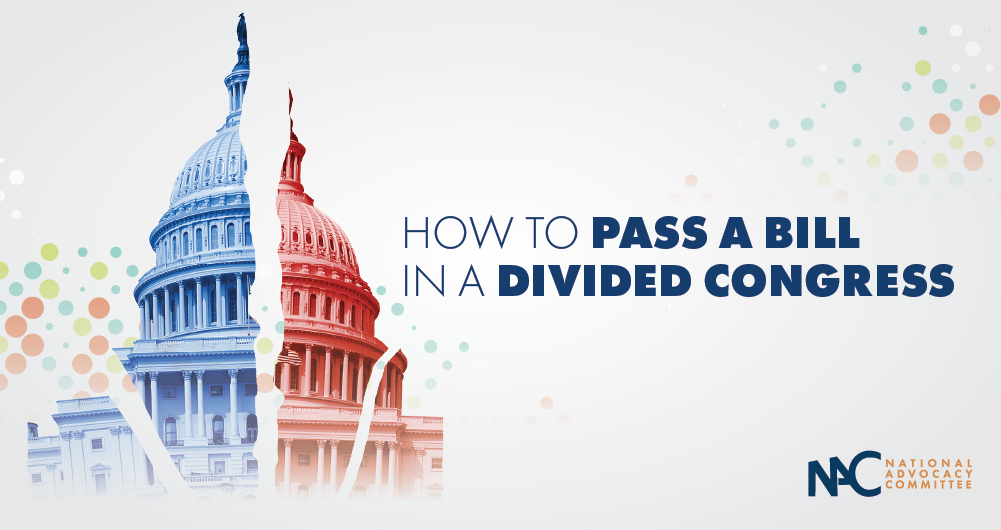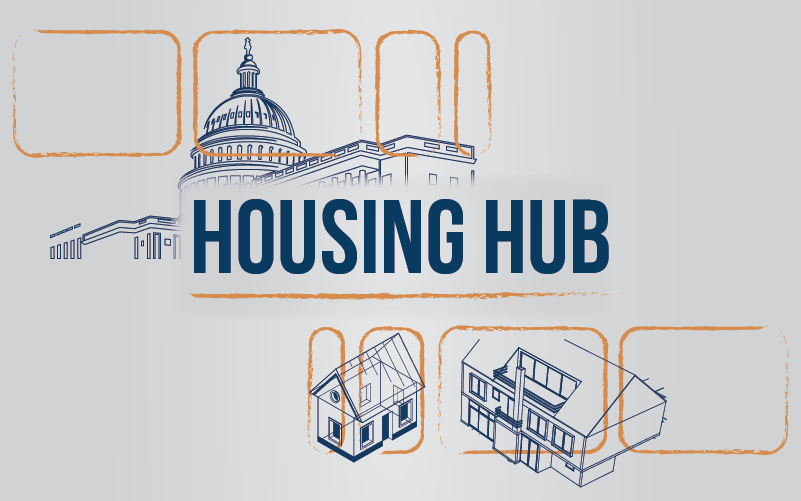NAC Blog: Passing a bill in a divided Congress
Celebrating NAHREP familia, cultura, politics, and grassroots action
May 27, 2021
Qué onda mi gente?!
First of all, a major shout-out to everyone who participated in NAHREP’s 2021 Capitol Hill Visits over the past two weeks. In total, NAHREP did 42 meetings and 202 of you participated in at least one meeting. Major kudos to our chapter leaders from around the country and our Government Affairs Directors. From Illinois to Texas, California to Florida, we traveled the country virtually, passionately advocating on behalf of our mission. But it doesn’t end there!
We created talking points and met together to prep before each meeting, essentially creating the road map to make sure that this is just the beginning of our advocacy work this year. You all have the tools to do more of these meetings going forward, and NAHREP national has a policy department that is here to help and support you every step of the way. Remember that relationships take time. It’s a long game not a one time transaction!

NAHREP is urging Congress to include housing inventory as part of the infrastructure package
One of the key things we urged our elected officials during our meetings was to ensure that housing inventory is a critical element of the big infrastructure package that is currently being debated in Congress. Our congressional representatives are currently right in the middle of negotiations.
Like I told all of our teams when we were doing prep calls for these meetings, the way that it works is that there are big packages, such as the infrastructure package, and as advocates, we all try to make sure that the bills we want get thrown into the “sopa.” NAHREP wants to make sure that housing production remains a non-negotianble in the final bill. The housing shortage has gotten so out of hand and it would be a massive missed opportunity if that infrastructure package doesn’t address housing production.
This is what we told our legislators: Pass an infrastructure bill and ensure that housing is included as a critical component of any national infrastructure package. We urge that the final infrastructure package addresses housing inventory shortages and includes the following bills:
- Housing Supply and Affordability Act to authorize a grant program for the development and implementation of housing supply and affordability plans.
- The Neighborhood Investment Act to allow federal tax credits for the purpose of neighborhood revitalization, and allow existing homeowners to stay in their homes.
- Yes in My Backyard (YIMBY) Act to encourage localities to advance policies that eliminate exclusionary zoning and artificial barriers to housing production.
- Build More Housing Near Transit Act to encourage coordination between transit agencies and local governments to align transportation investment with land use and zoning policy, enabling more housing in transit-served areas.

Passing a bill in a divided Congress: Things you might not know
Congress is a weird place and its rules are foreign to most people. So as these negotiations take place, understanding some of these weird rules might help you understand why our advocacy is going to be so important over the next few weeks.
Here are some things you might not know about passing a bill:
- Passing a bill: Before a bill becomes law, it has to get passed through the U.S. House of Representatives and the U.S. Senate. After it is passed in both chambers of Congress it goes to the President for signature. Even if a bill passes both the House and the Senate, the President still has the right to not sign the bill, also known as a veto.
- The President usually sets the vision for a package: Usually the President will set legislative priorities. For example, President Biden presented the fundamentals of what he wants to see in the infrastructure package. President Biden’s proposal included investing $213 billion to address the affordable housing crisis and eliminating exclusionary zoning laws, such as minimum lot sizes, mandatory parking requirements, and prohibitions on multifamily housing. The proposal gets sent to Congress to be changed, amended, negotiated. The President doesn’t just make laws. Bills have to pass through Congress first.
- In the Senate, most bills require more than a majority to pass: For a bill to pass in the House of Representatives, a simple majority is needed for a bill to pass. In the Senate, however, son mas complicados. The Senate has 100 members. You would think that a bill requires just 51 votes. But no. It takes 60 Senators to vote in favor of a bill in order for it to pass. This is usually very hard to do. Right now there are 50 Republicans, 48 Democrats and 2 Independents. The 2 Independents usually vote with the Democrats so that’s basically 50 Republicans and 50 Democrats. Vice President Kamala Harris serves as the tie breaker. This means that for President Biden’s infrastructure bill to pass, which right now includes housing production, it would need all 50 Democrats and Independents to vote in favor, PLUS 10 Republicans. The majority of bills get passed along party lines, which means that Republicans will vote for Republican bills, and Democrats will vote for Democrat bills. During times of high division, such as now, it’s difficult to get bipartisan support for bills in the Senate.
- The exception: Passing a bill through budget reconciliation: What the heck is budget reconciliation? This is one of those weird rules I was talking about. This is basically an exception that allows for Congress to pass legislation with only 51 votes instead of 60. Budget reconciliation can only to be used for taxes, spending and the debt limit – basically everything that gets passed has to have a financial component. This process can be used to pass the infrastructure bill ONLY if it eliminates any components that don’t including spending money and tax changes. That’s how the most recent stimulus bill, the American Rescue Plan, passed.
- How they vote for this bill is a big deal for us: Why should we care about this? I know you’re probably already getting bored with these technicalities, but IT MATTERS! Here are the scenarios:
- Pass with 60 votes: In this scenario, 10 Republicans would need to vote for the bill. That will likely require passing a smaller package and there is a good chance the housing provisions will get cut.
- Pass with 50 votes through reconciliation: If only Democrats vote for the bill, that will mean that bills that seek to ease zoning restrictions cannot be included because only bills that include money will be included in the package.
I know you’re scratching your heads but passing bills is complicated. All we know is that we are 15 years behind in building enough housing resulting in the lowest housing inventory in history, and first time homebuyers are being beat out by cash offers. Latinos are supposed to make up 70 percent of new homeowners over the next 20 years, but that can’t happen if we don’t address the housing inventory crisis. So let’s keep pushing mi gente and urge our legislators to put politics aside and to not let this opportunity we have in front of us pass us by.
Un abrazo familia.

About Noerena Limón
Noerena Limón is NAHREP’s Executive Vice President of Public Policy and Industry Relations. Noerena heads the organization’s policy and advocacy efforts on issues ranging from homeownership, housing inventory, credit access and immigration.
Prior to joining NAHREP, Noerena spent six years at the Consumer Financial Protection Bureau (CFPB) and served as a political appointee under President Obama in the White House Office of Political Affairs.



